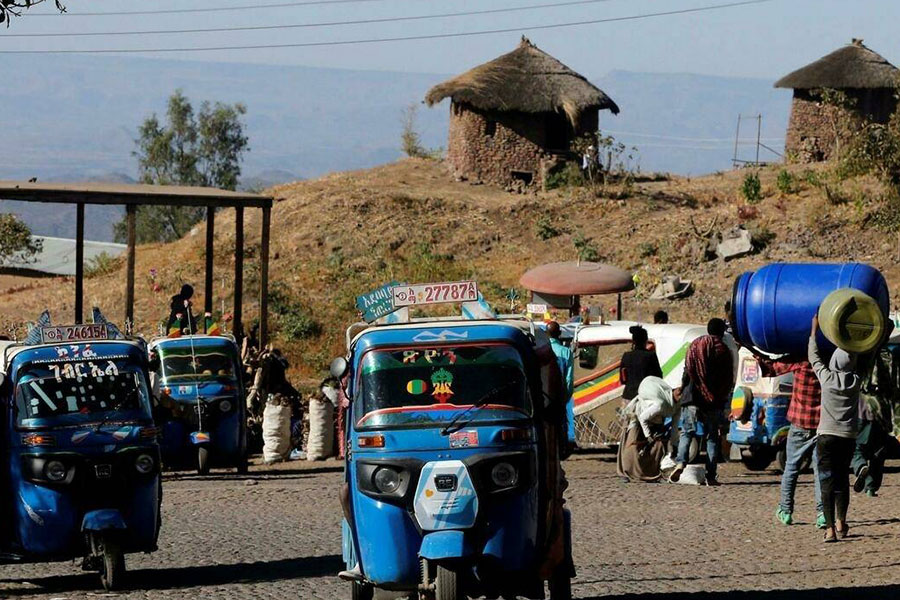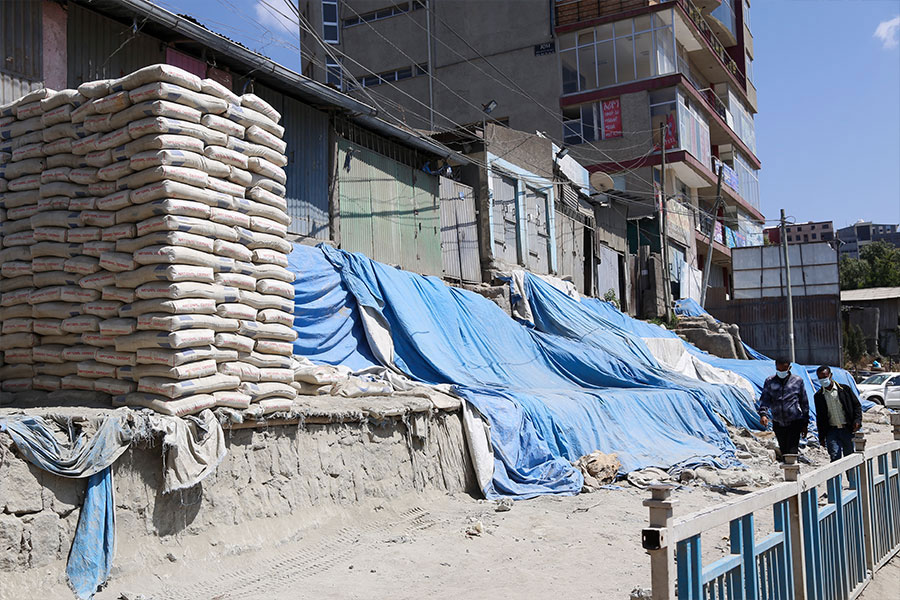
Radar | Apr 27,2025
Afri Flower lies in a secluded area five kilometres away from the main roads of Holeta, an area referred to as Wajetu Harbo Kebele by its inhabitants. There is barely any movement on the rough road leading to the farm, which sits at 2,300m above sea level, a strategic location chosen by the founders to produce better breeds of roses.
Sentayehu Kebede, general manager of Afri Flower, travels about 100Km to work every day from and to his home in Qality.
"I spend at least three hours a day on the road," he said, expressing that his frustration lies mostly with the quality of the road rather than the length.
Afri Flower, established in December 2013, is surrounded by farmlands that cultivate eucalyptus, barley, teffand wheat. Inside the farms, workers can be witnessed rushing about harvesting roses and other plants. Farm managers and supervisors communicate through walkie-talkies so as not to trouble themselves with the untenable mobile network in the area.
Sentayheu recalls the episode in the farm's not-so-distant past when sales were heavily bruised by the onset of the Novel Coronavirus (COVID-19) pandemic.
Afri Flower was among the floriculture heavyweights that was hit by the pandemic early on, even before the first case was reported in the country on March 13, 2020. Since January of that year, players in the industry were in shock at what was unfolding, as markets in Europe and Asia, the major export destinations for Ethiopian flowers, were shutting down in the hopes of preventing a health crisis.
However, unlike in the case of many others, the industry was saved from crumbling by a quick response from the government with the added efforts of the Ethiopian Horticulture Producers Exporters Association. Things are now looking up for the industry, which employs more than 200,000 people, with the all-important Valentine's Day season promising a return to the heights of pre-COVID-19 days.
Just about a year ago, multiple farms were reporting that they were burning down unsold items, and flowers that had been exported were similarly incinerated at their destinations for lack of recipients.
Afri Flower was one of the victims of the fiery phenomenon. The producer, whose parent company BellaFlor Group also operates floriculture farms in Ecuador, faced a shocking 20pc drop in sales revenues in January and February 2020, as the world was going into turmoil.
The company employees about 500 individuals and mainly cultivates standard roses, spray roses and gypsophila.
Sentayehu explains that the farm produces 32 varieties of roses year-round on five hectares of land and gypsophila on 10ha.
The company managed to hold onto its employees, who hail mostly from the neighbouring Holeta and Addis Alem areas, during the crisis. One of them, Jifare Dejene, a 23-year-old woman, can be found working in the packaging room at Afri Flower where flowers are cut and wrapped before being transferred to a freezing room where products are stored before being packaged for shipping.
Workers at Elilta Decor prep roses for delivery.
The employees, mostly women, spend their days standing in rows, handling the delicate flowers under the watch of Ethiopian and Ecuadorian supervisors.
Jifare is paid 70 Br a day.
"It was lower when I started out," she said.
The company incentivises employees with a monthly bonus, transportation service and two meals a day. Jifare and her colleagues had long been observing the strict COVID-19 preventive measures enforced at Afri Flower, such as working every other day, wearing masks and social distancing. However, things have now changed, and permanent employees are working five days a week.
The company sells directly to its customers instead of taking part in auctions, unlike many other floriculturists. Much of Afri Flower's business comes from the Middle East with some also stemming from China and Japan. However, demand does not spike in the Middle Eastern market during the Valentine's Day season; and be that as it may, the company observes up to 20pc more orders during the season from its direct global market. However, 2020 was not like any other year.
According to Sentayehu, the company suffered a 20pc decline in sales in 2020, earning slightly over 83 million Br in contrast to 2019's sales of 108.7 million Br.
He added that so far in 2021, the company had generated 11.2 million Br.
The flower export market is one of the cornerstones of the country's foreign currency earnings. Ethiopia is the fourth largest flower exporter in the world following Colombia, Ecuador and Kenya, a remarkable achievement for the 15-year-old industry. Over the past five years, the industry has generated more than 1.6 billion dollars, according to a report from the Association.
Despite the hurdles, the export revenues from floriculture surged by 64.6pc over the previous fiscal year, according to the central bank's annual report. This tremendous growth, which is unmatched in the realm of exports, is attributed to a 63.2pc increase in export volume and an almost one percent rise in international price levels. This is a big leap in contrast to the previous year's growth, which stood at 12.3pc. The half-year report from the Ministry of Agriculture states that the horticulture sector has generated 240 million dollars so far this fiscal year.
As soon as the effects of the pandemic were undeniable, the Association lobbied to get support from the government and a disaster was averted with the collaboration of the Ministry of Agriculture, according to Yemisrach Berhanu, promotion & information head at the Association.
As part of the measures enacted, producers were allowed to borrow working capital from banks. The primary aim was to allow the companies to maintain their workforce and avert an employment crisis that could have affected the whole country. The producers were also granted a debt grace period, and a quick return of their value-added tax was issued.
Sentayehu explains that although much of the export distribution mechanism has been made conducive, their business still faces challenges in terms of power interruptions and shortages in the supply of sugar, which is used to enhance the opening of flower buds after harvest.
Amidst the pandemic, the Ethiopian market still managed to export through Ethiopian Airlines' cargo services. The Agriculture Ministry negotiated with the Airlines to provide its services at lowered prices, according to Wondale Habtamu, state minister for Agriculture for the horticulture industry.
"With lowered cargo prices," he said, "Ethiopian flower products became competitive in the Netherlands' auction."
To top it all off, the Kenyan floriculture industry, the biggest competitor, was further weakened by flooding on top of the pandemic.
Tana Flora, a horticultural company established in 2008, was in total lockdown from early March to late April, according to Abinet Belayneh, marketing head at the company. Following that, the 125ha farm was forced to uproot six hectares of flowers.
Tana, which has more than 800 employees under its wing, produces avocados and other fruits and vegetables in addition to 15 varieties of roses.
Export has been promising even though destinations in Europe like Germany are still closed off. Against all odds, Valentine's sales have picked up tremendously, leaving Tana dumbfounded and thrilled. This year, Tana Flora has amassed one million euros in sales just from the Valentine's market, according to Abinet.
Another noticeable development in the flower industry is the growing demand in the local market over the past few years. More and more people can be noticed buying natural flowers for weddings, bridal showers, graduations and funerals.
Wondale believes that there is indeed a cultural shift being witnessed in the flower market for Valentine's Day celebrations and other events in general. There was no demand from the local market a few years back, he stated, but now people are inclined to buy natural flowers instead of artificial ones.
Elilta Decor, a company that has been in business for almost 11 years, is one of the growing beneficiaries of local demand. Initially only working weddings, the founders decided to expand to corporate events and provide flower arrangements for individuals and institutions, according to Birhanu Alemu, founder and managing director of the company.
Birhanu explains that the demand for flowers, especially for Valentine's season, has been growing fast over the past few years. Elilta, through its three branches located at Dembel City Centre, Snap Plaza and Kuriftu Resort, used to sell not more than 5,000 stems of roses during the season before 2017. After 2018, sales grew to the tens of thousands, reaching their peak in 2019 with up to 50,000 stems sold.
"Years of experience have given us the ability to forecast demand," he said.
The relationships the company has built with farms usually come in handy for Elilta. The company buys roses directly from farms at the cost of two or three Birr or from distributors at double the price. The roses are then retailed at 15 to 20 Br.
However, the story is not the same everywhere.
Messeret Aklilu, who has been in the flower retail business for eight years, highlighted that the past two years have not been as lucrative. Her small shop located near Bole Olympia generates much of its business from weddings and baby showers. Messeret explains that two years ago she was able to sell up to 1,000 stems a day on average during Valentine's season. Over the past two years, however, she sold around 300 a day.
The reason for the decline, noticed before the pandemic, is baffling for her too.
She purchases roses for five Birr each and sells them at double the price.
Messeret gets her daily supply from various farms located in Bishoftu [Debre Zeit] and Holeta. She remarked that there are frequent shortages of supply, especially during peak season.
Wondale confirms that the sector is not at all focused on meeting the demands of the local market, as the forex earnings are more lucrative and admittedly more important for the country's economy.
"As demand grows, the sector will look to satisfy the local market as well," he said.
Birhanu also confirms that 2020 was not a cheerful year for the company regarding Valentine's season sales. Elilta managed to sell around 17,000 roses. He is, however, confident about a brighter year in 2021, with pre-orders signaling that they will match their record 2019 sales.
He also concurs that there is not enough attention being given to local demand.
Demand for ornamental plants is on the rise. This is evident from the blossoming scene of roadside flower stalls on the highway that crosses Bishoftu, Adama [Nazareth] and Zeway. Economic development and improved living standards are perhaps behind the increase in demand, despite unfamiliarity with the indigenous culture, according to Hussien Mohammed (PhD), assistant professor at Hawassa University.
But studies have to be carried out to determine the types of flowers in demand and the volume in which the domestic market needs them. Internationally though, the market has to endure the pandemic's effects, despite supportive public policy and competitiveness in quality.
"The best quality of roses are grown in Ecuador," he said, "although Ethiopia isn't far behind."
PUBLISHED ON
Feb 13,2021 [ VOL
21 , NO
1085]

Radar | Apr 27,2025

Sunday with Eden | Jan 26,2019

Fortune News | Aug 12,2023

Sunday with Eden | Jan 09,2021

Agenda | Nov 06,2021

Radar | Nov 29,2020

Radar | Apr 02,2022

Fortune News | Jun 25,2022

Films Review | Apr 20,2019

Viewpoints | Nov 11,2023

Dec 22 , 2024 . By TIZITA SHEWAFERAW
Charged with transforming colossal state-owned enterprises into modern and competitiv...

Aug 18 , 2024 . By AKSAH ITALO
Although predictable Yonas Zerihun's job in the ride-hailing service is not immune to...

Jul 28 , 2024 . By TIZITA SHEWAFERAW
Unhabitual, perhaps too many, Samuel Gebreyohannes, 38, used to occasionally enjoy a couple of beers at breakfast. However, he recently swit...

Jul 13 , 2024 . By AKSAH ITALO
Investors who rely on tractors, trucks, and field vehicles for commuting, transporting commodities, and f...

Jul 5 , 2025
Six years ago, Ethiopia was the darling of international liberal commentators. A year...

Jun 28 , 2025
Meseret Damtie, the assertive auditor general, has never been shy about naming names...

Jun 21 , 2025
A well-worn adage says, “Budget is not destiny, but it is direction.” Examining t...

Jun 14 , 2025
Yet again, the Horn of Africa is bracing for trouble. A region already frayed by wars...